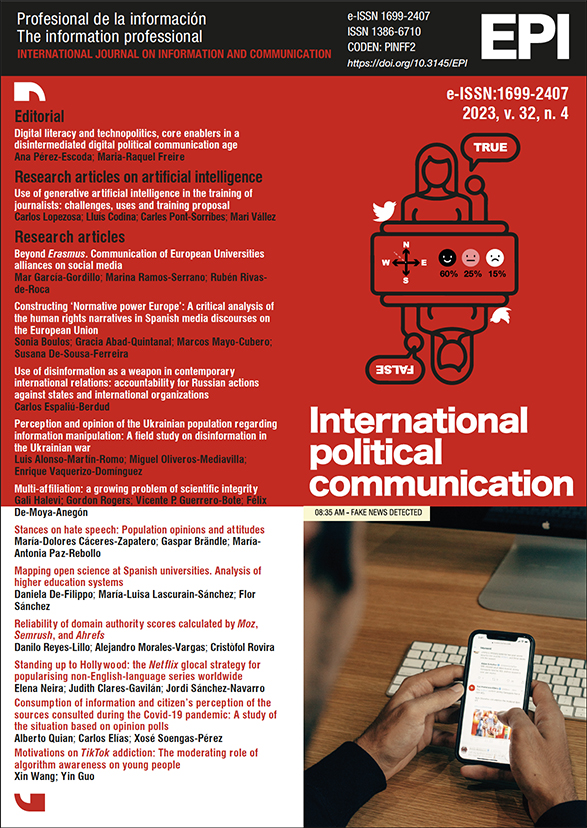Multi-affiliation: a growing problem of scientific integrity
DOI:
https://doi.org/10.3145/epi.2023.jul.01Palabras clave:
Multi-affiliation, Authorship, Institutions, Scientific integrity, Scholarly papers, Scientific contributionsResumen
The past decade has witnessed a substantial increase in the number of affiliations listed by individual authors of scientific papers. Some authors now list an astonishing number of institutions, sometimes exceeding 20, 30, or more. This trend raises concerns regarding the genuine scientific contributions these authors make at each institution they claim to be affiliated with. To address this issue, our study conducted a comprehensive regional analysis of the growth of both domestic and international multi-affiliations over the past decade. Our findings reveal certain countries that have experienced an abnormal surge in international multi-affiliation authorships. Coupled with the high numbers of affiliations involved, this emphasizes the need for careful scrutiny of the actual scientific contributions made by these authors and the importance of safeguarding the integrity of scientific output and networks.
Descargas
Citas
Ansede, Manuel (2023). "One of the world´s most cited scientists, Rafael Luque, suspended without pay for 13 years". El País English, April 2. https://english.elpais.com/science-tech/2023-04-02/one-of-the-worlds-most-cited-scientists-rafael-luque-suspended-without-pay-for-13-years.html
Bachelet, Vivienne C.; Uribe, Francisco A.; Díaz, Rubén A.; Vergara, Alonso F.; Bravo-Córdova, Fabiana; Carrasco, Víctor A.; Lizana, Francisca J.; Meza-Ducaud, Nicolás; Navarrete, María S. (2019). "Author misrepresentation of institutional affiliations: Protocol for an exploratory case study". BMJ Open, v. 9, n. 2, e023983. https://doi.org/10.1136/bmjopen-2018-023983
Bhattacharjee, Yudhijit (2011). "Saudi universities offer cash in exchange for academic prestige". Science, v. 334, n. 6061, pp. 1344-1345. https://doi.org/10.1126/science.334.6061.1344
Cai, Xiaojing; Fry, Caroline-Viola; Wagner, Caroline S. (2021). "International collaboration during the COVID-19 crisis: Autumn 2020 developments". Scientometrics, v. 126, n. 4, pp. 3683-3692. https://doi.org/10.1007/s11192-021-03873-7
Czerniawska, Dominika; Bochińska, Małgorzata; Oleśkiewicz Piotr; Mostowy Rafał (n. d.). Beyond recognition: Polish scientific diaspora as a source of social capital. Report by the Polonium Foundation. https://static1.squarespace.com/static/587a5f54d1758e3ceff5f171/t/5bee859040ec9aa70e7870d5/1542358423994/ScientificDiaspora_report_poloniumfoundation.pdf
EUR-Lex - 4609295 - EN - EUR-Lex (n.d.). https://eur-lex.europa.eu/EN/legal-content/summary/scientific-and-technological-cooperation-between-the-eu-and-tunisia.html
European Commission, Directorate General for Education, Youth, Sport and Culture (2021). Education and training monitor 2021: Country analysis. Publications Office. https://data.europa.eu/doi/10.2766/54808
Gómez-Flores, Paulina; Morales-Salgado, Vicente; Maza, Angélica; Villarreal, Aline; Lara-Jacobo, Linda R.; Jiménez-Córdova, Mónica-Ivette; Jiménez-Álvarez, Daniel; Hernández-Mondragón, Alma-Cristal (2022). "Mexican scientist diaspora in North America: A perspective on collaborations with México". Frontiers in research metrics and analytics, v. 7. https://doi.org/10.3389/frma.2022.898896
Gui, Qinchang; Liu, Chengliang; Du, Debin (2019). "Globalization of science and international scientific collaboration: A network perspective". Geoforum, v. 105. https://doi.org/10.1016/j.geoforum.2019.06.017
Haddad, Eduardo A.; Mena-Chalco, Jesús P.; Sidone, Otávio J. G. (2017). "Scholarly Collaboration in regional science in developing countries: The case of the Brazilian REAL network". International regional science review, v. 40, n. 5, pp. 500-529. https://doi.org/10.1177/0160017615614898
Hottenrott, Hanna; Lawson, Cornelia (2017). "A first look at multiple institutional affiliations: A study of authors in Germany, Japan and the UK". Scientometrics, v. 111, n. 1, pp. 285-295. https://doi.org/10.1007/s11192-017-2257-6
Hottenrott, Hanna; Lawson, Cornelia (2022). "What is behind multiple institutional affiliations in academia?". Science and public policy, v. 49, n. 3, pp. 382-402. https://doi.org/10.1093/scipol/scab086
Hottenrott, Hanna; Rose, Michael E.; Lawson, Cornelia (2021). "The rise of multiple institutional affiliations in academia". Journal of the Association for Information Science and Technology, v. 72, n. 8, pp. 1039-1058. https://doi.org/10.1002/asi.24472
Institution tables | Nature Index (2017, pp. November 23). https://www.nature.com/nature-index/institution-outputs/generate/all/countries-Ukraine/all
Kosyakov, Denis; Guskov, Andrey (2019). "Impact of national science policy on academic migration and research productivity in Russia". Procedia computer science, v. 146, pp. 60-71. https://doi.org/10.1016/j.procs.2019.01.080
Landini, Fabio; Malerba, Franco; Mavilia, Roberto (2015). "The structure and dynamics of networks of scientific collaborations in Northern Africa". Scientometrics, v. 105, n. 3, pp. 1787-1807. https://doi.org/10.1007/s11192-015-1635-1
Lee, Jenny J.; Haupt, John P. (2021). "Scientific globalism during a global crisis: Research collaboration and open access publications on COVID-19". Higher education, v. 81, pp. 949-966. https://doi.org/10.1007/s10734-020-00589-0
Leogrande, Angelo; Costantiello, Alberto; Laureti, Lucio; Matarrese, Marco-Maria (2022). International scientific co-publications in Europe [MPRA Paper], May 24. https://mpra.ub.uni-muenchen.de/113162
Liu, Hsuan-I.; Chang, Bi-Chun; Chen, Kuan-Chia (2012). "Collaboration patterns of Taiwanese scientific publications in various research areas". Scientometrics, v. 92, n. 1, pp. 145-155. https://doi.org/10.1007/s11192-012-0719-4
Moustafa, Khaled (2020). "Octopus affiliations". Scientometrics, v. 124, n. 3, pp. 2733-2735. https://doi.org/10.1007/s11192-020-03600-8
OECD (2022). The future of science in Ukraine. Actions now will affect post-war recovery. November 04. https://www.oecd.org/ukraine-hub/policy-responses/the-future-of-science-in-ukraine-afbd05df
Sadeh, Sadra; Mirramezani, Matin; Mesgaran, Mohsen B.; Feizpour, Amin; Azadi, Pooya (2019). The scientific output of Iran: Quantity, quality, and corruption. Stanford, Hamid and Christina Moghadam Program in Iranian Studies, February. https://iranian-studies.stanford.edu/iran-2040-project/publications/scientific-output-iran-quantity-quality-and-corruption
Sanfilippo, Paul; Hewitt, Alex W.; Mackey, David A. (2018). "Plurality in multi-disciplinary research: Multiple institutional affiliations are associated with increased citations". PeerJ, v. 6, e5664. https://doi.org/10.7717/peerj.5664
Subbotin, Alexander; Aref, Samin (2021). "Brain drain and brain gain in Russia: Analyzing international migration of researchers by discipline using Scopus bibliometric data 1996-2020". Scientometrics, v. 126, n. 9, pp. 7875-7900. https://doi.org/10.1007/s11192-021-04091-x
Varghese, N. V. (2022). "Academic collaborations in Asia". International journal of African higher education, v. 9, n. 3, pp. 177-200. https://doi.org/10.6017/ijahe.v9i3.16055
Descargas
Publicado
Cómo citar
Número
Sección
Licencia
Derechos de autor 2023 Profesional de la información

Esta obra está bajo una licencia internacional Creative Commons Atribución 4.0.
Condiciones de difusión de los artículos una vez son publicados
Los autores pueden publicitar libremente sus artículos en webs, redes sociales y repositorios
Deberán respetarse sin embargo, las siguientes condiciones:
- Solo deberá hacerse pública la versión editorial. Rogamos que no se publiquen preprints, postprints o pruebas de imprenta.
- Junto con esa copia ha de incluirse una mención específica de la publicación en la que ha aparecido el texto, añadiendo además un enlace clicable a la URL: http://revista.profesionaldelainformacion.com
La revista Profesional de la información ofrece los artículos en acceso abierto con una licencia Creative Commons BY.




